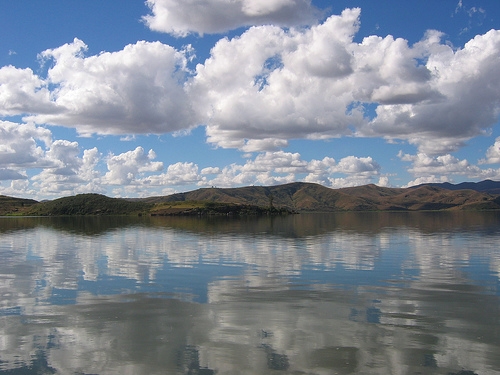 [1]
[1]
Lakes Region, Madagascar. Photo by Claude Springer. [2]
After seeing Al Gore's film on global warming, Malagasy blogger Aiky from group blog Madagascar Croissance, reflected this week on the effects of global warming in his country [3], stirring up debate among commentators to the blog.
Rainfall, Hurricane and Letchi Harvest
Dans l'état actuel des choses, il a été constaté diverses anomalies qui semblent être liées à ce phénomène. Tout d'abord, au niveau de la pluviométrie, ceux qui ont eu l'opportunité de visiter la Grande île l'année dernière ont pu constater que pour une fois depuis des années il n'y avait pas eu de passage de cyclone comme on peut s'y attendre tous les ans.
Pire, il n'a pratiquement pas plu!
Worse, it almost didn't rain!
Cette année, la saison de pluie tarde encore à venir. Ceci a un impact assez déplaisant au niveau de la campagne de letchis par exemple ou encore à d'autres cultures qui nécessitent une pluviométrie assez élevée. On s'attend déjà à ce que la récolte sera moins bonne cette année (2006) et on essaie d'anticiper en conséquence.
Relieved to find this discussion on the blogosphere, Tattum, a reader of the blog weighed in on the rain scarcity issue in the comments section:
Figure-toi qu'il n'a tellement pas plu, que le niveau de Mandroseza est tellement bas, que le quartier de mes parents, où il paraît le réseau d'eau est si vétuste (et que sais-je encore), et bien, ils ont des coupures d'eau pouvant durer toute une journée.
Je me demandais aussi pourquoi la plupart de nos voisins avaient des châteaux d'eau au fond de leur jardin, maintenant on comprend mieux.. On en est là quoi… Je ne fais pas un topo à quel point ma famille (et plein d'autres) est excédée par la situation.
I was also wondering why most of our neighbors had water tanks in the back of their yards, and now I get it … That's what things have come to … I can't even begin to explain how much my family (and many others) are overwhelmed by the situation.
Temperature Changes
In the original post, Aiky continued:
Le réchauffement de la planète semble ainsi bouleverser le climat du pays. On constate un léger augmentation de la température générale avant la période normale. Cette augmentation est del'ordre de 1 à 1,5 degré Celsius. En effet, en cette période de l'année (mois d'octobre) les températures doivent déjà avoisinner les 8 à 29° alors qu'actuellement on peut constater une température variant de 10 à 31°
Remote Areas Hit Hardest
Pour l'heure, c'est toujours les régions assez reculées comme Amboasary dans le sud qui sont les principaux victimes. Les différents projets d'adduction d'eau ne sont pas suffisants et la population locale se nourrit encore de cactus “Raketa” à cause de l'absence d'autres aliments (manioc, riz, etc.)
Le trou dans l'ozone est déjà un problème majeur pour la planète et si on ajoute le réchauffement de la planète, onpeut s'attendre à une mutation immédiate des espèces vivants.
Avis aux responsables…
Word to the wise…
Deforestation
JoganY, another reader to the blog wrote in the comments section:
N'oublie pas aussi de relever que nous sommes intimement concernés car nous “avions” une grande résèrve de forêt primaire que nous avons déléctueusement grillé au bûcher des vanités.
L'inconscience et l'appât du gain à court terme prônent évidemment sur les solutions durables et induisent des conséquences irréversibles. L'exploitation intensive des terres par le tavy et l'exploitation du charbon de bois ruinent nos campagnes et nos forêts. Malgré l'intensité de la sensibilisation (je veux bien le croire), la “Vertitude” (Néologisme de jogany entre “vertu” et “vegetation” pas des meilleurs je sais…)de Madagascar se perd dans les torrents du Betsiboka ou d'un autre fleuve couleur sanguine.
Kyoto dans un de ses chapitres propose le système du “Droit à la Pollution” (un truc horrible mais horrible), j'imagine encore une fois que certains vont se jeter sur ce nouveau filon (ben oui des $ $, le rêve!). Histoire d'aggraver la situation mais bien entendu là encore, on n'y peut rien…
Lack of conscience and short-term gain obviously prevail over durable solutions and inducee irreversible consequences. The intensive exploitation of lands by tavy and charcoal exploitation ruin our countryside and our forests. Despite the intensity of outreach campaigns (or so I want to believe), the “Green Virtue” … of Madagscar is being lost in the torrents of Betsiboka or of another blood-colored river.
Kyoto in its chapters proposes a system of “pollution rights” (a horrible, horrible thing). I can imagine that some will throw themselves at this new idea (yes $,$, what a dream!). All of this will probably make things worse but here again, nothing we can do…